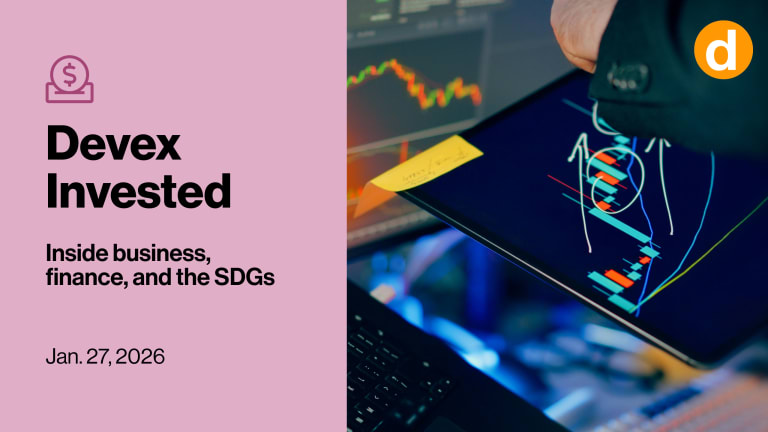Are guarantees the most underrated tool in development finance?
“Now, unfortunately, we’re on a journey almost without maps,” said Leslie Maasdorp, the CEO of British International Investment, at a Devex Pro Briefing event.
If Leslie Maasdorp — the head of the United Kingdom’s development finance institution, British International Investment — had a magic wand, he’d use it for one thing: guarantees. “Guarantees are the most underrated, underutilized instrument in development finance,” said Maasdorp, speaking during a recent Devex Pro event. Guarantees are a financial instrument where a third party — such as a government, multilateral development bank, or DFI — promises to cover some or all of a commercial lender’s losses in the event a loan or other project finance is not repaid They offer protection against risks such as political instability, project failure, or borrower insolvency. This makes it easier for commercial banks and private investors to back infrastructure, energy, and social sector projects in low- and middle-income countries. However, despite their potential, guarantees account for only about 2% of total business across many of the world’s largest multilateral development banks, according to an analysis by the Institute for Energy Economics and Financial Analysis, or IEEFA. “You could create an entity that could be capitalized by all of the [multilateral development banks] together, backed by a few, or several of the triple-A rated governments, and it could scale, at another level, the availability of guarantees,” Maasdorp added. His comments came less than two weeks before the Financing for Development Conference, which will gather thousands in Sevilla, Spain, from June 30 to July 3. The conference is the fourth to be held since 2002 — and this time, it’s taking place in unprecedented circumstances. “Now, unfortunately, we’re on a journey almost without maps,” Maasdorp said. “We don’t know what this final architecture of development will look like. … We should be making the case, in a new way, for why development is in fact necessary.” Amid widespread cuts to official development assistance, rising geopolitical tensions, and fundamental shifts to the sector, Maasdorp described how the development landscape is facing three profound shifts today. The first, he said, was that development was becoming “inward-looking,” with the United States’ “safer, stronger and more prosperous” logic rippling across the world. “That transactional model, I believe, takes us backwards,” Maasdorp added. The second is a growing focus on the private sector, one that was born at the Third Financing for Development Conference in 2015 and is continuing to take on prominence in today’s context. And third, Maasdorp said, MDBs and DFIs will need to become more self-sufficient, whether that is by looking at balance sheet optimization measures, forming new partnerships, or finding new ways of working to be less reliant on government support. As a result, he said, both types of institution will need to move away from a donor-recipient type model to one focused on investment and trade. “We need a change in mindset, a change in culture,” Maasdorp said. “We’re entering a different era.” Don't miss out on future briefings. Browse our events calendar for our next live conversations.
If Leslie Maasdorp — the head of the United Kingdom’s development finance institution, British International Investment — had a magic wand, he’d use it for one thing: guarantees.
“Guarantees are the most underrated, underutilized instrument in development finance,” said Maasdorp, speaking during a recent Devex Pro event.
Guarantees are a financial instrument where a third party — such as a government, multilateral development bank, or DFI — promises to cover some or all of a commercial lender’s losses in the event a loan or other project finance is not repaid
This story is forDevex Promembers
Unlock this story now with a 15-day free trial of Devex Pro.
With a Devex Pro subscription you'll get access to deeper analysis and exclusive insights from our reporters and analysts.
Start my free trialRequest a group subscription Printing articles to share with others is a breach of our terms and conditions and copyright policy. Please use the sharing options on the left side of the article. Devex Pro members may share up to 10 articles per month using the Pro share tool ( ).
Elissa Miolene reports on USAID and the U.S. government at Devex. She previously covered education at The San Jose Mercury News, and has written for outlets like The Wall Street Journal, San Francisco Chronicle, Washingtonian magazine, among others. Before shifting to journalism, Elissa led communications for humanitarian agencies in the United States, East Africa, and South Asia.








